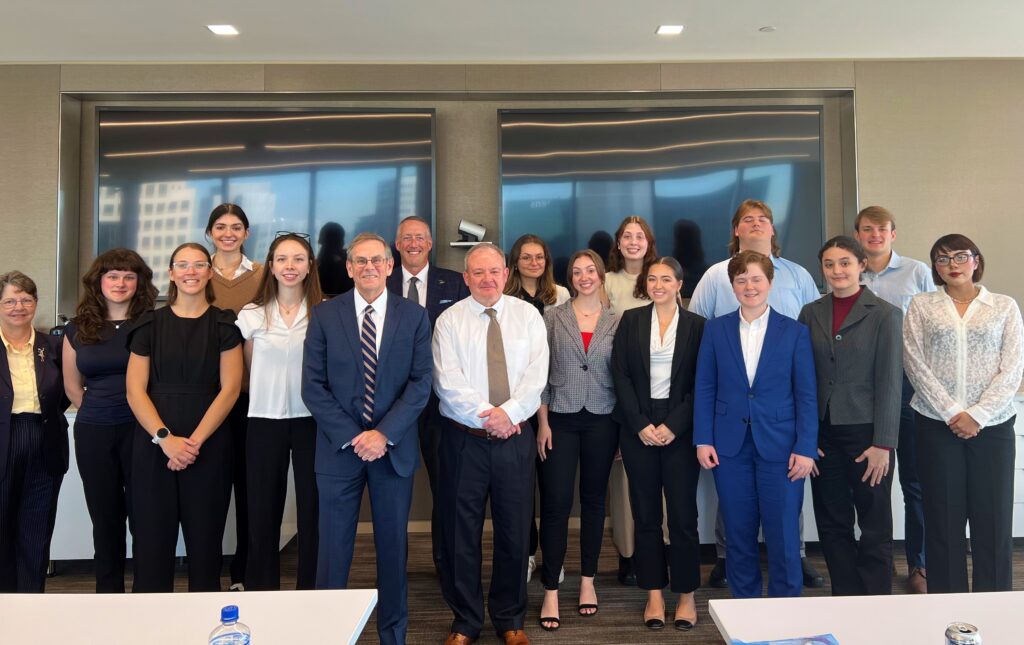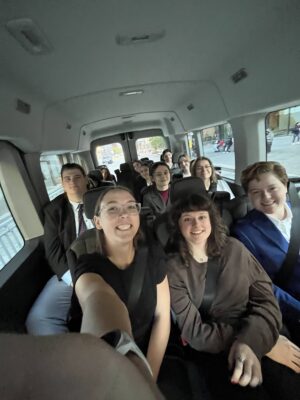
Cora Wilkins-McKee ’27 has long been interested in social justice and breaking down barriers. The international studies major and energy and society minor was intrigued by law as a pathway to fulfilling her dream of lifting up communities, but she had no exposure to what lawyers do. This is where Allegheny’s practical approach to experiential learning stepped in.
“There are so many different depictions of the legal field out there, whether in social media, stereotypes, etc., and I needed help to understand what it is really about,” says Wilkins-McKee.
So when Director of the Allegheny Center for Political Participation (CPP) Andy Bloesser, Professor of Political Science Brian Harwood, and several alumni helped to set up visits to Pittsburgh law schools and firms, she and 14 other students leapt at the opportunity.
Associate Director for Pre-Professional Advising Kirsten Peterson, led the trip with Major Gifts Officer Sally Barrett ‘92 and Vice President for Institutional Advancement Matt Stinson.

The day of experiential learning began at McGuireWoods law firm to learn from Jerry Stubenhofer ’90 and Ben Dauber ’14, who shared their post-Allegheny journeys. They provided detailed examples of their litigation, mergers and acquisitions, and corporate and private equity work. Over lunch, the students met Steve Kaufman ’81, a recently retired assistant United States attorney for the Western District of Pennsylvania. Stubenhofer arranged for the students to meet with Allegheny County Court of Common Pleas Judge Christine Ward in her courtroom.
“The students got a look at Duquesne and Pitt Law schools, made a visit to the courthouse, and spent time at a large, prestigious law firm. From the alumni, I think they gained some different perspectives, a lot of encouragement, and invitations for follow-up contact,” says Peterson.
They also met with law school admissions staff, Olivia Brophy ‘23 and John Fazio ‘20, now attending the Thomas R. Kline School of Law Duquesne University.
Allegheny College does not offer a “pre-law” major, similar to most universities and colleges, because law schools do not require any specific major for admission. In fact, the Association of American Law Schools advises students not to pursue specific “pre-law” programs. Instead, it recommends completing precisely the kind of broad-based curriculum featured at Allegheny, to develop skills that are crucial for law school and careers. The academic rigor, experiential learning opportunities (like the trip to law firms), courts and law schools help students build their future in law.
Wilkins-McKee says she was incredibly impressed with everyone she met on the trip to Pittsburgh, and that all alumni were excited to provide advice.
“They helped me develop a clearer picture of the legal field, and answered all of the questions I had, whether it was about internships, law school, the Bar, types of law, or gap years,” says Wilkins-McKee.
Students all agreed the trip was tremendously helpful and informative. With generations of family who are native Pittsburghers, Wilkins-McKee is certain she will be applying to law school there and eventually serve in the public arena.


